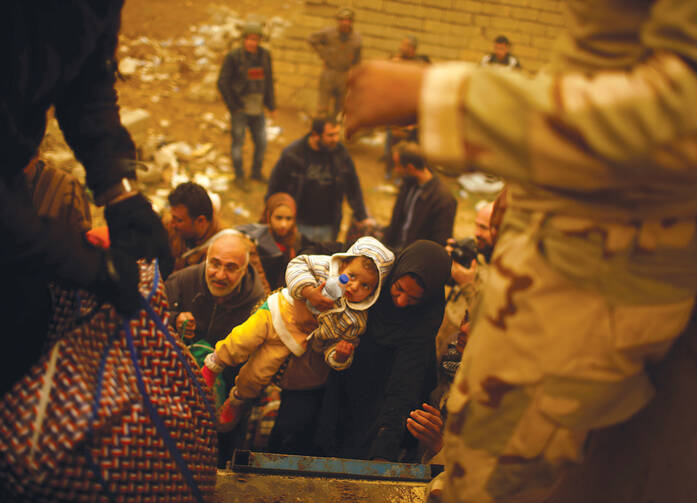Speaking from Baghdad on Dec. 14, Kevin Hartigan, Catholic Relief Services’ regional director for the Middle East, Central Asia and Europe told America that his team was bracing for what may be unprecedented numbers of people in flight from the contested city. “The numbers still are not nearly as large as we expected because the battle for the city is looking to be a long and slow one, unfortunately for everybody.
“Mosul is a very big city and up to now what has been happening is people are moving between neighborhoods within the city, and that may be the pattern of the displacement we see,” Mr. Hartigan said.
“They have more possibility of finding shelter within the city without venturing into the desert around it.” That is a treacherous enterprise not only because of exposure to the elements but because of the possibility of becoming caught in the crossfire between ISIS and Iraqi defense forces or falling prey to ISIS militants. Scores of displaced people have also been killed by improvised explosive devices as they attempted to reach safety.
Displaced Iraqis are already arriving from other smaller cities, where the fight to extricate ISIS has been just as intense as in Mosul.
“We’re providing a lot of assistance to the people coming out of the town of Hawija,” Mr. Hartigan said. The strategically significant Hawija, once a city of more than 100,000, is an ISIS stronghold about 130 miles north of Baghdad and 34 miles southwest of Kirkuk.
“They’re arriving on foot and they’re really fleeing...active battles,” Mr. Hartigan said. Many have to “seize a moment to escape” as lulls in fighting occur. That means recently displaced people arrive at the camps with little more than the clothes on their backs. “They have remarkably few possessions with them, even by the standards of displaced people,” Mr. Hartigan said.
C.R.S., in conjunction with local partner Caritas Syria, has also been assisting scores of families among more than 85,000 who fled previous fighting in Fallujah to relative safety in central and northern Iraq.
The newcomers will be facing harsh winter conditions as they await the conclusion of the struggle against ISIS. North of the Nineveh Plain in Kurdistan, “it will be snowing and below freezing at night.” More temperate weather can be anticipated closer to Baghdad, but even there cold and wet weather is typical at night. Conditions in the camps can be “very unhealthy, particularly for small children.”
While many have hunkered down in temporary shelters in camps for displaced people, others have taken refuge in unfinished buildings that are often exposed to the elements. C.R.S. teams, in addition to providing kerosene space heaters, blankets and mattresses at the camps, have been assisting in winterizing these impromptu shelters, sealing openings and installing temporary windows and doors.
No one can say when or if people will be able to return to their communities after ISIS is driven out. The region’s infrastructure and communities have been pounded by months of street fighting, suicide car bombs, I.E.D.s and U.S. and coalition air strikes. Many communities have just been “demolished,” Mr. Hartigan reports.
“There is a question how safe these places are; a lot of them are still near conflict zones,” Mr. Hartigan said. Christian and Sunni families hoping to return to villages near the front lines have to contend with unexploded ordnance, booby traps and mines, according to Mr. Hartigan.








